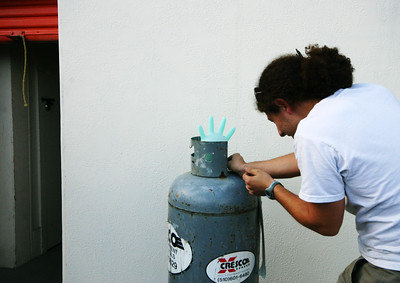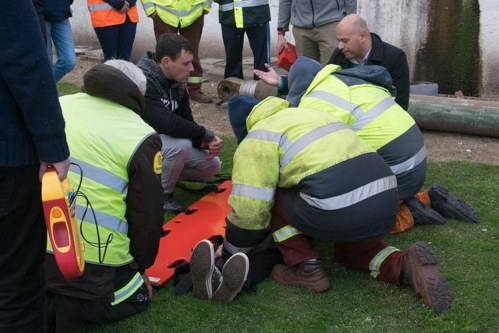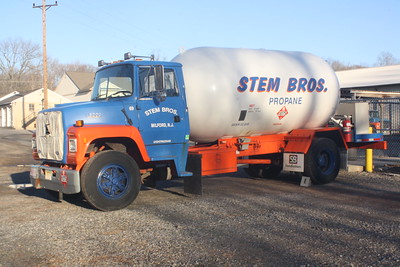
If you have a propane leak in your home, you will need to take action to get the propane out of your house. Propane is a highly flammable gas, so it is important to evacuate the area and call your gas company or a propane specialist immediately. Once the area is safe, you can follow these steps to get the propane out of your house.
How to get propane out of your house
A. Ventilation: Your Immediate Response
- Open Windows and Doors
- As soon as you smell gas, your first move is to ventilate. Quickly open all windows and doors to help dilute the propane gas. This simple action can significantly lower the chance of a fire or explosion.
- Use Fans to Circulate Air (If Safe)
- If you have an explosion-proof fan (and only if it’s safe to do so), position it to blow air out of the house, pushing the propane gas along with it. Be absolutely certain that the concentration of gas is low to minimize the risk of ignition. Remember, never use a regular fan as it can cause sparks.
B. Immediate Actions in the Event of a Leak
- Evacuate the Premises
- Your safety is paramount. If you suspect a propane leak, don’t hesitate to evacuate everyone from the house immediately. Avoid anything that could create a spark — that means no light switches, no phones, and no appliances until you’re a safe distance away.
- Contact Emergency Services or a Propane Professional
- Once you’re at a safe distance, call 911 or your local emergency services. Use your cell phone or a neighbor’s phone outside the house. Follow this up by contacting a professional propane service provider to inspect and repair the leak.
C. Handling Minor Propane Leaks
- Turn Off Gas Valves
- If you can safely do so, shut off your propane tank’s valve. This is a critical step in preventing more gas from escaping. Ensure you know where your main gas supply valve is located and how to operate it.
- Safely Contain the Leak
- In the case of a small, manageable leak, such as from a portable propane tank, carefully move the tank outdoors to an open area away from potential ignition sources. This will allow the gas to safely dissipate into the atmosphere.
- If the leak is minor and you feel confident in doing so, apply soapy water to the connection points of the tank or hose. Bubbles will form at the site of the leak, giving you a visual indication. However, don’t attempt any temporary fixes. Leave repairs to professionals.
Throughout this process, keep your calm but act swiftly. Propane has a distinct odor, similar to rotten eggs or a skunk’s spray — this is your cue to take action. Don’t underestimate the seriousness of a propane leak; it can have dangerous consequences if not managed promptly and appropriately.
Always prioritize safety over property or inconvenience. Remember, no matter how small you believe a leak to be, propane gas can accumulate in enclosed spaces and pose a significant threat. It’s better to be overly cautious and ensure your household’s safety.
Contacting a Professional to Do the Job
A. When to Call a Professional
- You should call a professional for propane removal if you smell gas and cannot identify the source or if the leak is in a space you cannot safely access. If you’ve turned off the valve but still smell propane, or if you’re at all uncertain about the situation, it’s time to call in a professional.
- After a major natural disaster, like an earthquake or flood, even if you don’t smell propane, it’s wise to have a professional inspect your system for potential leaks or damage before you start using propane again.
- If your propane detectors go off, vacate the area and contact professionals immediately. These alarms are designed to detect gas concentrations well before they reach dangerous levels, so their warning should be heeded without delay.
- Whenever you’re replacing, removing, or installing propane tanks or appliances, professional assistance ensures safe handling and adherence to local regulations and codes.
B. What to Expect from a Professional Service
- A professional service technician will first ensure the area is safe upon arrival. This might mean checking for gas concentrations or sources of ignition.
- They will conduct a thorough inspection of your propane system, including tanks, hoses, connectors, and appliances. The technician will identify the source of the leak or potential hazard and take appropriate action to fix it.
- You can expect the technician to perform any necessary repairs or replacements and test the system once the work is complete to make sure it’s operating safely.
- A good service professional will also educate you on what caused the issue and how to prevent it in the future. They may offer advice on regular maintenance and safety checks.
- After service, the technician should provide a detailed report of what was done, what was found, and any recommendations for future action.
C. Disposal of Propane Tanks
- Disposing of propane tanks should never be done by simply throwing them in the trash. When it’s time to dispose of a propane tank or cylinder, a professional can ensure it’s done safely and in compliance with local regulations.
- If the tank is still partially full, the professional will have the tools and knowledge to safely remove the remaining propane. They may transfer it to another container or use it in a controlled manner.
- The technician can then render the tank safe for disposal, which typically involves removing the valve to ensure no gas is left inside, and marking the tank to indicate it’s empty and depressurized.
- They will know the proper facilities or recycling centers where the tanks can be taken for recycling or disposal.
- Always ask the technician if there is a “take back” program in place. Some suppliers will accept old tanks and give you a discount on a new one, or they might refurbish and reuse the tank.
Remember, working with propane requires specialized knowledge and tools — always err on the side of caution and rely on professional services when it comes to handling this fuel. Your safety and that of those around you is not worth the risk of a do-it-yourself approach when dealing with a volatile substance like propane.
Post-Propane Removal
A. Checking for Residual Odors or Leaks
- Once the propane has been removed, and the immediate danger has passed, you’ll need to be vigilant for any lingering odors. If you still detect that distinctive rotten egg or skunky smell, it may indicate that there’s some residual gas or another leak.
- Use your nose first to detect if there’s any area where the smell is stronger, and avoid using matches or lighters for this purpose.
- You may consider using a handheld gas detector to check for leaks. These devices can sense even small amounts of propane in the air, giving you peace of mind.
- Remember, if at any point you do detect a smell, it’s best to call professionals back to ensure there isn’t an ongoing leak.
B. Airing Out the House
- Ventilation is key after a leak has been contained. Open all windows and doors to allow fresh air to circulate through your home.
- Use fans to help drive out any gas that may be lingering in the air, but only if it’s been confirmed safe to use electrical devices.
- Leave the house ventilated for as long as necessary until the smell has completely dissipated. Depending on the size of the leak and your home’s layout, this could take several hours.
- You may also want to temporarily remove pets and sensitive plants as some animals and plants are more sensitive to propane and its odors.
C. Inspecting and Servicing the Propane System Before Reuse
- Before you begin using your propane system again, a thorough inspection and service must be carried out by a qualified professional.
- The technician will check all appliances and connections for damage or wear that could cause future leaks. They’ll also test the pressure in the propane lines and ensure the tank is functioning properly.
- Make sure they check the integrity of the entire system, including any safety features like excess flow valves.
- Request that the technician walk you through any updates or changes made to the system and provide guidelines on how to properly maintain it going forward.
- Do not attempt to restart the system yourself; the reactivation of the propane supply should be done by a professional to ensure it’s done safely.
Always keep a record of any service performed, including dates, descriptions of work done, and any parts that were replaced. Good record-keeping can help with future maintenance and provide a log that can be useful if any warranty or insurance issues arise. After a propane emergency, taking these steps helps ensure your home is safe and your system is in optimal working condition for the safety and comfort of everyone inside.
What Can You Do to Temporarily Fix the Problem
Short-term Measures
- If you are dealing with a temporary situation that makes the use of propane inadvisable, you may opt for a short-term shutdown of your propane supply. This can be achieved by turning off the main gas supply valve on your propane tank.
- During this shutdown, you should ensure that all propane appliances are also turned off to prevent any accidents when the propane supply is eventually turned back on.
- Safety Inspections
- Prior to resuming use, a thorough safety inspection should be conducted to ensure that all components of the propane system are in good working order. This is particularly important if the system was shut down due to suspected leaks or malfunctions.
- Maintaining Appliance Readiness
- Even while the propane supply is shut down, it’s important to keep the appliances clean and in good repair so that they are ready to function safely and efficiently when the propane is turned back on.
Conclusion
In wrapping up our discussion on propane removal from your home, it’s essential to highlight the critical importance of safety when dealing with propane. From ventilation to professional removal, every step is aimed at ensuring your home remains a safe environment. If you suspect a leak or face a propane-related issue, prompt action is vital. Open windows, leave the area, and call for professional help.
Alternatives to propane, such as electricity or natural gas, offer viable options for those looking to transition away from propane. These choices not only cater to safety concerns but can also align with efforts to adopt more sustainable energy sources.
It cannot be stressed enough that propane should be handled with care. If you’re ever unsure about how to manage a propane system or deal with a potential leak, it’s always wiser to defer to the expertise of professionals. They are equipped to manage these situations safely and effectively, providing you with the necessary support to address your propane concerns. Always prioritize safety and professional guidance to ensure the well-being of your household.

Mike is an experienced propane technician with over 15 years of professional experience in the field. He has dedicated his career to helping customers with their propane needs, from installation to maintenance and repair. Together with Jeremy, he co-founded this website to provide useful information and guidance to customers seeking reliable propane services.



